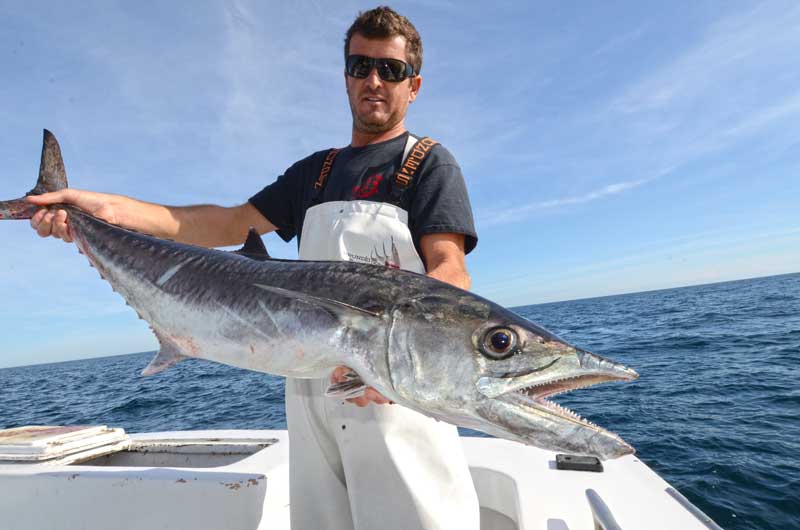King mackerel are an exciting fish to catch, and they can grow to over 50 pounds with most of the ones we see in Delaware, Maryland, and Virginia weighing 20 to 30 pounds. They have a mouth full of teeth and attack their prey in a slashing manner, cutting it into pieces. Unless properly rigged, the king will always get away with the part of the bait without the hook.

These fish have extremely good eyesight. While fishing a king mackerel tournament out of Morehead City, NC, I observed from the flybridge a 30- to 40-pound king swim up and follow alongside a perfectly rigged live menhaden. The fish was watching the bait very closely and must have seen something he didn’t like because he dropped back down as quietly as he had appeared.
Kings will also sky on a bait. This is a fantastic sight to behold. You will be running along trolling three or four live baits when all of a sudden, a big king mackerel will leap into the air, fly all the way across the spread, and land perfectly on the farthest bait. Try to think about the logistics of that. Leave one medium (water) travel through another medium (air) to land on a target that was only a ripple on the surface.
Slow trolling with live menhaden or bunker is hands down the best way to catch a big king mackerel. Why else would all those king mackerel tournament fishermen go to all that trouble to get the freshest bait and make the best rigs?
The fisherman who wants to catch a king off of Indian River, Ocean City, or Virginia Beach need not go to all that trouble. Although, there are some pretty dedicated king fishermen out of Virginia Beach.
When looking for king mackerel, good structure is the place to begin. Wrecks, reefs, channel edges, and tidelines all attract bait and bait attracts kings.
My favorite king mackerel setup is a 3-1/2 Drone spoon behind a three-ounce trolling or torpedo sinker. I use a 30-foot length of 30-pound Hi Seas mono fishing line attached to the sinker with a ball bearing swivel. The weight of the sinker can vary from one to as many as six ounces. Anything heavier than six and you should go to a planer.
Planers come in different sizes, and I use #2 and #3 for kings. With larger size planers I would use a hand line with the fishing line attached with an outrigger or downrigger clip.
Trolling speed is a subject of much debate. Some believe fast is best while others think a moderate speed is just as good. I have found five to six knots works fine with spoons.
Big plugs also attract king mackerel. The Mann’s Stretch 25s and 30s have caught well for me and don’t require all the rigging necessary with spoons and planers.
I attach a six-foot section of Hi Seas 30-pound fishing line to the plug and then to a ball bearing swivel on my running line. Let the plug back 50 to 75 feet, engage the reel, and pull the plugs at three to four knots. Make sure the rod tip vibrates a nice steady beat and the plug never spins or tries to jump out of the water. Always remember, the speed of the water going past the plug is not the same as the speed of the boat over the bottom.
I use my 20-pound trolling outfits for kings. They are custom rods with Penn 113H reels filled with 30-pound Hi Seas mono. I have had them a very long time.
Slow trolling with live bait is a bit more complicated. First, you have to cast-net the bunker, and then you have to keep it alive in a tank in the boat. Then you have to make or buy live bait rigs. These are tied out of light wire and carry two small treble hooks spaced so one goes on the nose of the bait and one goes near the tail or hangs free.
With these tiny hooks playing a 50-pound fish requires a soft drag and a soft rod. A regular trolling rod and reel will not work.
Most boats will run two live baits while others, think big money tournament boats, can run many more. It is an acquired taste.
With the ocean water getting warmer every year I am sure we will continue to see king mackerel off our coast. If you get the chance, give them a try. You won’t be disappointed.
By Eric Burnley